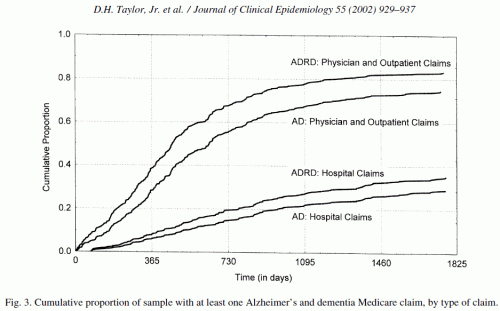A simple methodological question has always fascinated me:
How good are Medicare claims records as an epidemiological tool?
Medicare claims record the payment by Medicare for services, and have been used to answer a variety of research questions. For some purposes they are great, such as how much Medicare paid for care. For other purposes, such as tracking the incidence and prevalence of disease through the use of ICD-9 diagnosis codes, it is less clear and likely differs by disease. The motivation for using Medicare claims are that they provide a way to look at a large population of great policy interest–namely those persons covered by traditional fee for service Medicare.*
About 12 years ago during a program project site visit at Duke, I suggested that Medicare claims could be an efficient way to track changes in prevalence of Alzheimer’s Disease (AD). A Neurologist on the site visit committee said he bet that only 10% of true AD cases would be identified in claims. A challenge!
We put together a project team and provided an initial answer to the question (gated; looking for ungated, reference below)–79% of true AD cases were identified in Medicare claims if you used 5 years of claims and included Physician and outpatient claims and not only hospital files (87% of true cases were identified when using a broader group of ICD-9 codes, AD and related dementias).
This provided some evidence that claims were a great deal better than the Neurologist on the site visit had surmised, but questions remained. The source of the true dementia diagnosis was autopsy data collected as part of the Consortium to Establish a Registry for Alzheimer’s Disease (CERAD) study; participants had their Medicare claims history linked to their records. However, because CERAD enrolled patients through memory disorders clinics in major teaching hospitals, the worry remained that the cases were more severe than average, and that their participation in the CERAD study could have affected the way their Medicare claims were coded by community-based physicians (CERAD-specific interactions did not bill Medicare). Further, to truly assess the ability of claims to identify AD, you would need to not only know the sensitivity, but the specificity (false positive). More pieces of the puzzle were needed to give a full answer, which I will get to in a follow up post.
Donald H. Taylor, Jr., Gerda G. Fillenbaum, Michael E. Ezell. The accuracy of medicare claims data in identifying Alzheimer’s disease. Journal of Clinical Epidemiology 2002;55:929-37.
*A limitation of Medicare claims is that they do not provide information for persons choosing Medicare Advantage plans.


